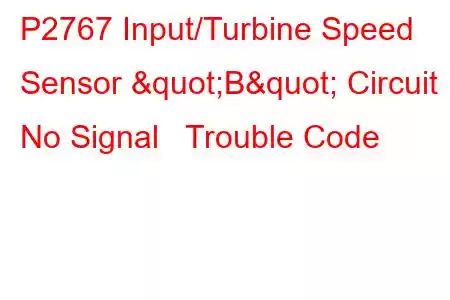Home » P2700-P2799 Codes » P2767 P2767 Input/Turbine Speed Sensor B Circuit No Signal
OBD-II Trouble Code Technical Description
Input/Turbine Speed Sensor "B" Circuit No Signal
What does that mean?
This diagnostic trouble code (DTC) is a generic powertrain code, which means that it applies to all 1996-newer vehicles (Ford, Honda, Mazda, Mercedes, VW, etc.). Although generic, the specific repair steps may vary depending on make/model.
When I run across a trouble code P2767, it is because the powertrain control module (PCM) has detected no voltage output from the circuit of the input (or turbine) speed sensor that has been given the designation "B". Input and turbine speed sensors are virtually identical in design, and serve the same purpose, but manufacturers use variations in terminology to describe them.
The input/turbine speed sensor is typically a 3-wire, electromagnetic sensor that is used to monitor transmission input speed (identified by the PCM as revolutions per minute or RPMs). The sensor is usually mounted with a bolt/stud or threaded directly into the transmission case. It is normally positioned near the rear of the bell housing (at the transmission input shaft)
Specially designed grooves (or a notched reluctor wheel) are permanently attached to the transmission main (or input) shaft. As RPMs are transferred from the engine to the transmission, the input shaft (or reluctor wheel) spins and passes in close proximity to the end of the sensor. The steel shaft (or reluctor wheel) completes an electronic/electromagnetic circuit. The circuit is interrupted as the grooved (or notched) areas pass by the sensor and an electronic pattern is formed. This pattern formation is received by the PCM as a waveform that it is programmed to interpret as transmission input/turbine speed.
In order to determine the desired input RPM speed, transmission input/turbine speed is compared with engine RPM speed, percentage of engine load, and transmission output speed. A code P2767 will be stored (and a malfunction lamp may be illuminated) if the actual input/turbine speed, or system circuit voltage, fail to coincide with the desired input/turbine speed or manufacturer’s specified voltage.
Symptoms
The P2767 indicates a complete loss of circuit voltage for the input/turbine speed sensor. Symptoms of a P2767 code may include:
Intermittent or erratic speedometer (odometer) operation Inability of the transmission to shift at all Inoperative speedometer and/or odometer Erratic or harsh transmission shift points A decrease in fuel efficiencyCauses
Potential causes for this code to set are:
A faulty input speed sensor B Damaged, loose, or shorted wiring and/or connectors in the circuit PCM failure or a PCM programming errorDiagnostic and Repair Procedures
A good starting point is always to check for technical service bulletins (TSB) for your particular vehicle. Your issue may be a known issue with a known fix put out by the manufacturer and can save you time and money during diagnosis.
A manufacturer’s service manual, an advanced diagnostic scanner, a digital volt/ohmmeter (DVOM), and possibly an oscilloscope will be helpful in diagnosing the P2767 code.
Experienced technicians usually begin this diagnosis with a visual inspection of system wiring and connectors. Shorted or open circuits and/or connectors must be repaired or replaced before proceeding. Inspect the battery, battery cables, and cable ends. I would test alternator output at this time.
Now is the time to connect the scanner to the diagnostic port and retrieve all stored codes. Write them down for future reference and make a note of the freeze frame data as well.
If there are input sensor and output sensor codes present, use the scanner data stream to determine which circuit
Read: 17


